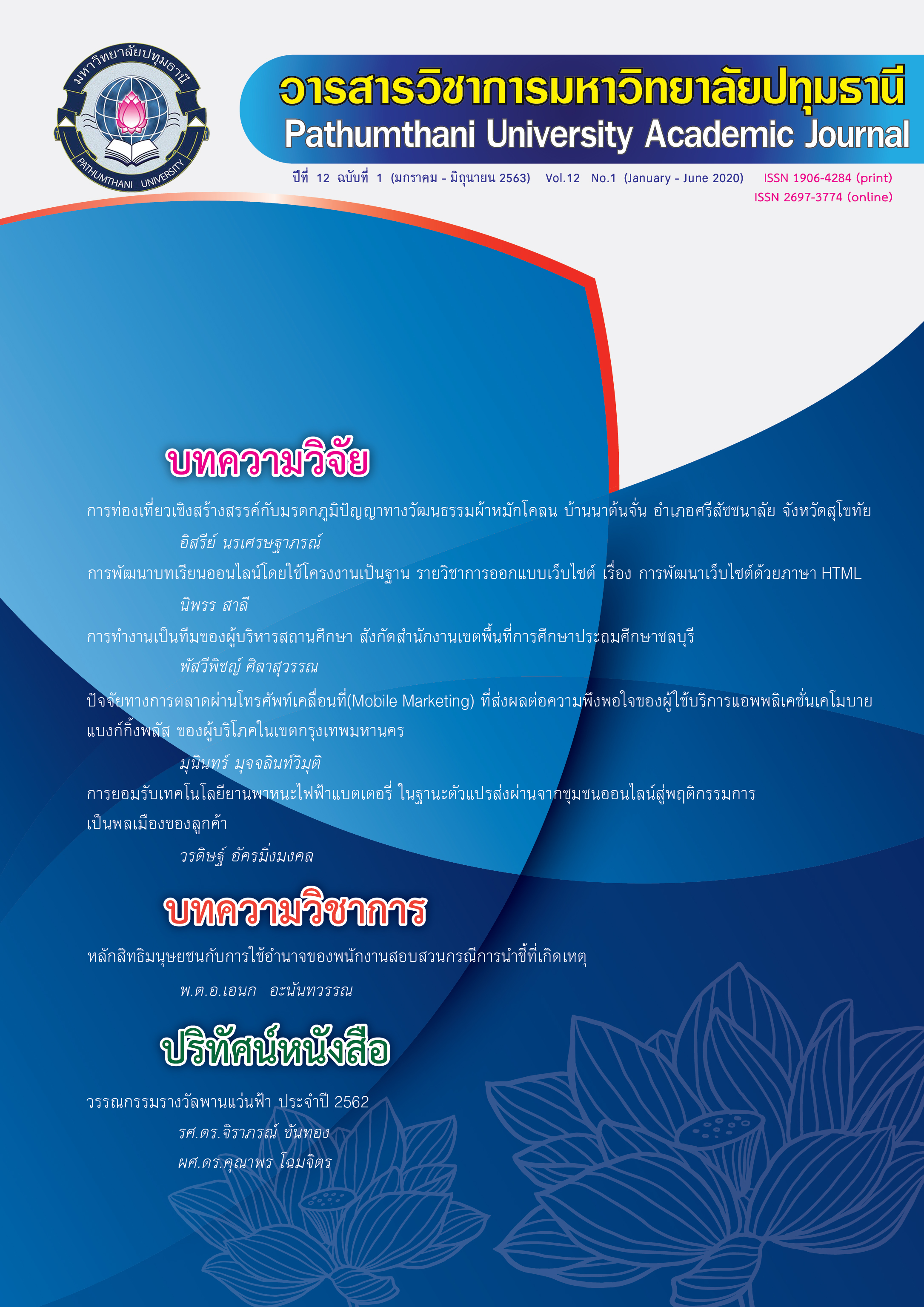THE DEVELOPMENT OF ONLINE LEARNING USING PROBLEM BASE (PBL) ON GENERAL APPLICATIONS OF STATISTICS IN HYPOTHESIS TESTING FOR UNDERGRADUATE STUDENTS
Keywords:
Online learning, Problem baseAbstract
This research is a research and education development that has objectives 1) to develop and find the effectiveness of online lessons by using Online Learning Using Problem Base (PBL) such as: General Applications of Statistics in Hypothesis Testing for Undergraduate Students who have effectiveness in accordance with E1 / E2 = 80/80, 2) to study the effectiveness index of Online Learning Using Problem Base (PBL) on General Applications of Statistics in Hypothesis Testing 3) to study the satisfaction of learners with online lesson by using Online Learning Using Problem Base (PBL) on General Applications of Statistics in Hypothesis Testing for Undergraduate Students. The population who has been used in this research is the year 2nd undergraduate students of Rambhai Barni Rajabhat University who has enrolled General Applications of Statistics in Hypothesis in academic year 2/2018. The sample group which has been nominated randomly (Cluster Sampling) by using study groups units as a unit for random that get a class for sample group. The tools in this case stud are consisted of 1) Online Learning Using Problem Base (PBL) on General Applications of Statistics in Hypothesis Testing 2) Before and after learning achievement assessment 3) Satisfaction questionnaires. The results found that: 1) Development online lessons using Online Learning Using Problem Base (PBL) on General Applications of Statistics in Hypothesis Testing for Undergraduate Students who have effectiveness in accordance with E1/E2 82.17/81.00 in accordance with the specified standard, 2) The effectiveness index of Online Learning Using Problem Base (PBL) on General Applications of Statistics in Hypothesis Testing is .80 or 80.11 percent, 3) Students who has studied from online lessons by using Online Learning Using Problem Base (PBL) on General Applications of Statistics in Hypothesis Testing for Undergraduate Students have the high satisfaction with an average of 4.46 and a standard deviation in .52.
References
ขนิษฐา สวรรค์พรม. (2558). การพัฒนากิจกรรมการเรียนรู้แบบใช้ปัญหาเป็นฐานร่วมกับบทเรียนออนไลน์เพื่อส่งเสริมความสามารถในการคิดวิเคราะห์ เรื่อง การเขียนโปรแกรมภาษาซี สำหรับนักเรียนชั้นมัธยมศึกษาปีที่ 5. วิทยานิพนธ์ปริญญาการศึกษามหาบัณฑิต. สาขาวิชาวิทยาศาสตร์ศึกษา. มหาวิทยาลัยนเรศวร.
เขมณัฏฐ์ มิ่งศิริธรรม. (2555). “การพัฒนารูปแบบการเรียนการสอนออนไลน์แบบสืบสอบ สำหรับนักศึกษาระดับบัณฑิตศึกษามหาวิทยาลัยสุโขทัยธรรมาธิราช”. วารสารวิชาการ Veridian E-Journal บัณฑิตวิทยาลัย มหาวิทยาลัยศิลปากร. ปีที่ 4 ฉบับที่ 2 หน้า 302-311.
ไชยยศ เรืองสุวรรณ. (2533). เทคโนโลยีการศึกษา : ทฤษฎีและการวิจัย. กรุงเทพมหานคร : โอเดียนสโตร์.
ถนอมพร (ตันพิพัฒน์) เลาหจรัสแสง. (2545). Designing e-Learning : หลักการออกแบบและการสร้างเว็บเพื่อการเรียนการสอน. เชียงใหม่ : มหาวิทยาลัยเชียงใหม่.
น้ำทิพย์ วิภาวิน. (2543). ห้องสมุดดิจิตอล. กรุงเทพมหานคร : ดวงกมลสมัย.
ประภัสสร กองทอง. (2557). ผลของการเรียนการสอนผ่านเว็บโดยใช้ปัญหาเป็นฐานที่มีรูปแบบการปฏิสัมพันธ์ทางการเรียนแตกต่างกันในวิชาระบบฐานข้อมูลของนักศึกษาระดับประกาศนียบัตรวิชาชีพชั้นสูง. วิทยานิพนธ์ปริญญาการศึกษามหาบัณฑิต. สาขาวิชาเทคโนโลยีทางการศึกษา. มหาวิทยาลัยมหาสารคาม.
สำนักงานเลขาธิการสภาการศึกษา กระทรวงศึกษาธิการ. (2550). การจัดการเรียนรู้แบบใช้ปัญหาเป็นฐาน. กรุงเทพมหานคร : ชุมนุมสหกรณ์การเกษตรแห่งประเทศไทย.
อุมาพร ต้อยแก้ว. (2554). การพัฒนาบทเรียนออนไลน์โดยใช้เทคนิคการเรียนรู้แบบปัญหาเป็นฐานเพื่อพัฒนาทักษะการคิดวิเคราะห์ วิชาการเขียนโปรแกรมภาษาซี สำหรับนักเรียนชั้นมัธยมศึกษาปีที่ 5. วิทยานิพนธ์ปริญญาครุศาสตร์อุตสาหกรรมบัณฑิต. สาขาวิชา ครุศาสตร์เทคโนโลยี. มหาวิทยาลัยเทคโนโลยีพระจอมเกล้าธนบุรี.
Downloads
Published
How to Cite
Issue
Section
License
บทความที่ได้รับการตีพิมพ์เป็นลิขสิทธิ์ของวารสารมหาวิทยาลัยปทุมธานี
ข้อความที่ปรากฎในบทความแต่ละเรื่อง เป็นความคิดเห็นส่วนตัวของผู้เขียน กองบรรณาธิการไม่จำเป็นต้องเห็นด้วยเสมอไป และไม่มีส่วนรับผิดชอบใด ๆ ถือเป็นความรับผิดชอบของผู้เขียนแต่เพียงผู้เดียว



